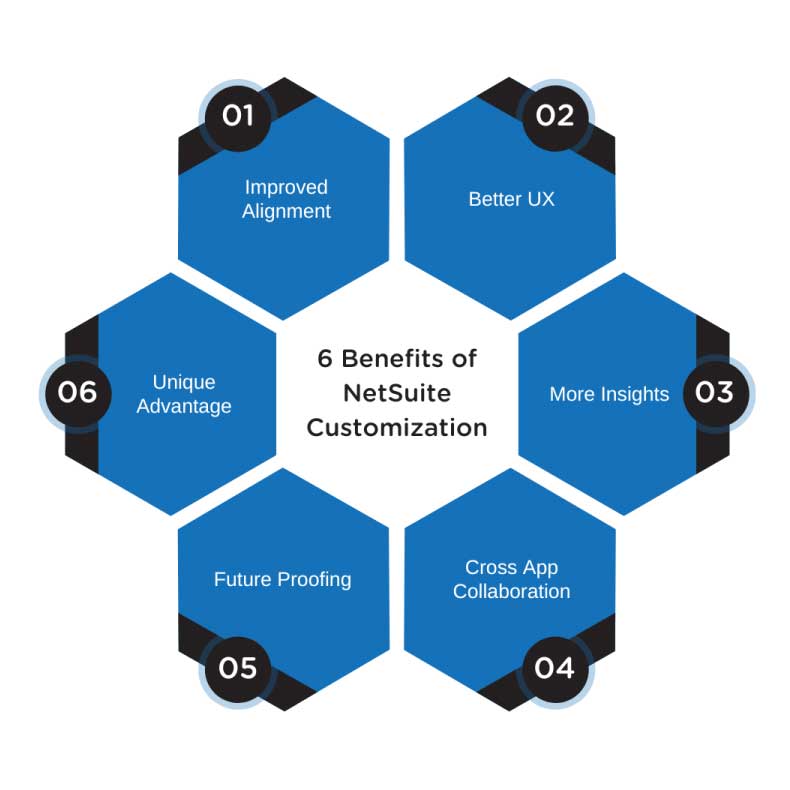- CALL : (+1) 407-273-1001
- Main Office : (+1) 407-273-1001
- NetSuite NetSuite Customization
- Aug 16
- 6 mins read
What is NetSuite Customization? The 2023 Complete Guide
NetSuite, as a leading cloud-based ERP system, has gained immense popularity among businesses worldwide. However, to truly harness its potential, customization is often necessary. In this comprehensive guide, we delve into the world of NetSuite customization, exploring its significance and benefits.
We will unravel the various customization options available within NetSuite, including SuiteBuilder, SuiteScript, and SuiteFlow. Moreover, we will provide best practices to ensure successful customization, discuss the challenges and considerations involved, and shed light on the importance of partnering with NetSuite customization experts. By the end, you’ll have a solid understanding of NetSuite customization and its role in optimizing business operations.
What is NetSuite Customization?
NetSuite customization refers to tailoring the NetSuite system to meet specific business requirements. It involves modifying and configuring various aspects of NetSuite, such as workflows, forms, fields, and user interfaces, to align with unique processes and workflows. Customization empowers businesses to optimize their operations, streamline workflows, and enhance overall efficiency within NetSuite. It can be achieved through different tools like SuiteBuilder, SuiteScript, and SuiteFlow. By leveraging these customization options, businesses can adapt NetSuite to their specific needs, integrate third-party applications, automate processes, and gain a competitive edge in their industry.
Benefits of Customizing NetSuite

NetSuite customization offers several key benefits for businesses leveraging NetSuite:
- Alignment with Unique Workflows: Every business has its own distinct processes and workflows. NetSuite customization allows businesses to align the system with their specific requirements, ensuring a seamless fit and optimizing efficiency. Customizing fields, forms, and workflows helps streamline operations and enhances productivity.
- Enhanced User Experience: Customization empowers businesses to create a user-friendly interface tailored to their employees’ needs. By simplifying navigation, adding relevant fields, and automating repetitive tasks, businesses can improve user adoption and overall satisfaction with the NetSuite system.
- Improved Reporting and Insights: Customization enables businesses to capture and analyze data that is specific to their operations. By creating custom reports, dashboards, and KPIs, businesses can gain valuable insights, make informed decisions, and identify trends, ultimately driving growth and profitability.
- Integration with Third-Party Systems: NetSuite customization allows seamless integration with other critical systems and applications. This integration eliminates data silos, facilitates information exchange, and enhances cross-functional collaboration, leading to better visibility and streamlined processes across the organization.
- Scalability and Future-Proofing: As businesses grow and evolve, customization ensures that NetSuite adapts to changing needs. Customization allows businesses to add new functionality, incorporate industry-specific requirements, and accommodate future expansions, providing long-term scalability and flexibility.
- Competitive Advantage: Customization enables businesses to differentiate themselves in the market. By tailoring NetSuite to their unique processes and customer requirements, businesses can deliver personalized experiences, improve customer satisfaction, and gain a competitive edge over competitors.
Things to Consider Before a Customization
Before embarking on NetSuite customization, it’s crucial to consider the following key factors:
- Business Requirements: Clearly identify your specific business requirements and pain points that necessitate customization. Conduct a thorough analysis of your workflows, processes, and desired outcomes to determine if customization is the most suitable solution.
- Cost and ROI: Evaluate the cost implications of customization, including development, implementation, and ongoing maintenance. Assess the return on investment (ROI) and weigh it against the potential benefits and improvements it will bring to your business operations.
- NetSuite Upgrade Compatibility: Understand how customization may affect future NetSuite upgrades and compatibility. Consider whether customizations will require additional efforts to adapt or if they may become obsolete with system updates, potentially impacting functionality and support.
- Expertise and Resources: Assess your internal resources and expertise in NetSuite customization. Determine whether you have the necessary skill sets to handle the customization process in-house or if it’s more beneficial to seek assistance from NetSuite consultants or implementation partners.
- Scalability and Flexibility: Consider your business’s future growth plans and scalability needs. Ensure that the customization approach allows for future modifications and expansions without causing disruptions or limitations.
- Integration with Third-Party Systems: If your business relies on other systems or applications, evaluate the compatibility and integration requirements. Consider whether the customization can seamlessly integrate with existing or future third-party systems, ensuring smooth data flow and process automation.
- Support and Maintenance: Plan for ongoing support and maintenance of the customizations. Determine how updates, bug fixes, and system enhancements will be managed to ensure the long-term stability and reliability of your customized NetSuite environment.
Types of NetSuite Customization
SuiteFlow
SuiteFlow is a visual workflow management tool within NetSuite that enables businesses to automate and streamline their unique business processes. It allows users to design, configure, and customize workflows using a drag-and-drop interface, making it accessible to non-technical users. SuiteFlow automates approvals, routing, notifications, and data transformations, providing increased efficiency and control over critical processes.
For example: Let’s consider a scenario where a company wants to automate its purchase approval process. Using SuiteFlow, they can design a workflow that automatically routes purchase requests to the appropriate approver based on predefined rules, sends notifications to stakeholders at each step, and updates the purchase order status upon approval or rejection. SuiteFlow streamlines the entire purchase approval process, reducing manual effort and improving accuracy.
SuiteBuilder
SuiteBuilder is a user-friendly customization tool in NetSuite that allows businesses to tailor their NetSuite environment by modifying and configuring various aspects without requiring coding knowledge. It provides a range of customization options such as adding custom fields, creating custom records, modifying forms, and designing workflows.
For example: Consider a company that wants to add a custom field to track a customer’s preferred communication channel. With SuiteBuilder, they can easily create a custom field within the customer record to capture this information. This customization allows the company’s sales and support teams to personalize their interactions with customers based on their communication preferences, leading to better customer satisfaction and engagement.
SuiteScript
SuiteScript is a powerful scripting language that allows businesses to customize and extend NetSuite’s functionality by writing custom scripts. It provides full control over business logic, data manipulation, and integration with external systems. SuiteScript supports server-side, client-side, and scheduled scripting options, enabling businesses to automate complex processes, integrate with external APIs, and create tailored solutions.
For example: Let’s say a company needs to automate the creation of sales orders based on a specific condition. They can use SuiteScript to write a script that monitors incoming purchase orders, evaluates the criteria, and automatically generates corresponding sales orders in NetSuite. This customization streamlines the order processing, eliminates manual data entry, and improves order accuracy and efficiency.
Best Practices for NetSuite Customization
When it comes to NetSuite customization, following best practices ensures a successful implementation and maximizes the benefits. Here are some key best practices to consider:
- Conduct Thorough Business Process Analysis: Before initiating any customization, thoroughly analyze your existing business processes and workflows. Identify pain points, inefficiencies, and areas that require improvement. This analysis will help you prioritize customization needs and align them with your business objectives.
- Set Realistic Goals and Prioritize: Clearly define your customization goals and set realistic expectations. Prioritize the customizations based on their impact and value to your business. Start with essential customizations that address critical needs and gradually move towards more complex or non-essential ones.
- Follow NetSuite’s Recommended Customization Guidelines: Familiarize yourself with NetSuite’s documentation and best practices for customization. Adhering to these guidelines ensures compatibility, stability, and easier upgrades. It also helps maintain a well-structured and maintainable customization environment.
- Test and QA Customizations: Thoroughly test all customizations before deploying them in a live environment. Develop a testing plan that covers various scenarios, edge cases, and integration points. Perform quality assurance (QA) to ensure that customizations work as intended, don’t impact existing functionalities, and deliver the desired results.
- Involve Stakeholders and Obtain User Feedback: Engage relevant stakeholders, including end-users, in the customization process. Gather their feedback, involve them in the design and testing phases, and incorporate their input. This ensures that the customizations meet their needs, improves user adoption, and enhances user satisfaction.
- Document Customizations and Processes: Maintain comprehensive documentation of all customizations, including their purpose, functionality, and any associated processes. Documenting customizations helps with knowledge transfer, troubleshooting, and future maintenance or enhancements.
- Leverage NetSuite Community and Resources: Take advantage of the NetSuite community, user groups, and resources available. Engage in forums, attend webinars, and leverage documentation to learn from others’ experiences and stay updated on the latest customization trends and techniques.
- Engage Experienced NetSuite Consultants: If your organization lacks expertise or resources, consider partnering with experienced NetSuite consultants or implementation partners. They can provide valuable insights, guidance, and expertise throughout the customization process, ensuring a successful implementation. To speak with some customization experts check out our NetSuite Development Page.
NetSuite Customization FAQ
What is customization in NetSuite?
- Customization in NetSuite refers to the ability to modify the software to fit unique business needs. It includes altering layouts, fields, and workflows, enhancing the NetSuite ERP platform’s functionality.
Is Oracle NetSuite customizable?
- Yes, Oracle NetSuite is highly customizable. It provides tools for personalized configurations, tailored to individual business processes within the NetSuite environment.
How do I customize my NetSuite view?
- To customize your NetSuite view, navigate to customization preferences and modify layouts, fields, or dashboards according to your requirements within the NetSuite platform.
How do I create a custom field in NetSuite?
- Creating a custom field in NetSuite requires accessing the Customization Manager, selecting the relevant record type, and defining the field parameters, making NetSuite even more adaptable.
What are the different types of customization?
- Different types of customization include user interface customization, module customization, third-party integrations, and more. These customizations are often seen in platforms like NetSuite ERP to meet specific needs.
What is an example of ERP customization?
- An example of ERP customization is altering the financial reporting module in a system like NetSuite to fit the specific regulatory compliance and reporting needs of a company.
Final Thoughts
Customizing your NetSuite environment can be a big boost to your ROI and productivity. With the right experts in place and the right plan, businesses can extend the use case of their NetSuite ERP and give themselves a leg up against the competition. If you have any questions about the process or think I missed anything, please let me know in the comments.
Jeremy McCourt is an content producer in the enterprise software industry that focuses on NetSuite and related cloud-based software solutions.
Related Posts

NetSuite Training 101 (The 2023 Complete Guide)
NetSuite training is an underrated and often overlooked part of the NetSuite ecosystem. In this article, we do what we can to break down why NetSuite training is a critical part of NetSuite users finding…
- Aug 21
- 6 mins read

What is a NetSuite Administrator? (Quick 2023 Guide)
In the world of ERP, the role of the NetSuite Administrator is indispensable. As more businesses begin to embrace cloud ERP and NetSuite, they will need talented system managers with NetSuite experience who can proficiently…
- Aug 02
- 8 mins read
